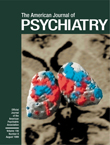Risperidone-Induced Tardive Dyskinesia
To the Editor: A few reports of tardive dyskinesia occurring while a patient was receiving risperidone have appeared in the last few years (1–5). However, these cases are fraught with complex factors that might have caused the dyskinesia—i.e., previous exposure to other neuroleptic drugs, a high propensity for developing tics, old age, and systemic illness that affected the central nervous system. Here we report a case of tardive dyskinesia that developed while a patient was on a regimen of risperidone.
Ms. A, a 21-year-old, single, female college student, came to the Samsung Medical Center Outpatient Clinic with complaints of auditory hallucinations. She had had ideas of reference and difficulties in social adaptation for the past year or so. She did not have any major illness or movement disorders. Her motor, sensory, and cerebellar functions were intact; no focal signs were detected. Results of an EEG were normal. After being diagnosed with schizophrenia according to DSM-IV criteria, Ms. A was placed on a regimen of risperidone, 1 mg/day, and trihexyphenidyl, 2.5 mg/day. Her symptoms subsided gradually during the first 2 months, and there were no adverse effects such as extrapyramidal symptoms. Her dose of risperidone was increased to 1.5 mg/day, and trihexyphenidyl treatment was discontinued by the third month. At this point, her psychotic symptoms had subsided completely, and her medication dose was maintained.
In the fifth month of treatment, Ms. A began to show involuntary perioral and tongue movements. Chewing motions and vermicular movements of the tongue were noticeable even when her mouth was closed. No other involuntary movements were seen in the rest of her body. Neither cogwheel rigidity nor tremor was observed. One month after the onset of dyskinetic symptoms, risperidone treatment was replaced with sulpiride, 100 mg/day. Two months of sulpiride treatment did not cause any significant improvement in Ms. A’s tardive dyskinesia symptoms; therefore, her medication was changed to a regimen of clozapine. She soon switched back to sulpiride because she could not tolerate the sedative effect of clozapine. Presently, Ms. A is on a regimen of sulpiride, 100 mg/day, which maintains her remission from psychotic symptoms. Her dyskinetic symptoms are held to a minimum. We wish to change her medication to olanzapine in the near future.
In conclusion, unlike previous reports, this one clearly demonstrates the cause-and-effect relationship of risperidone and tardive dyskinesia in a patient whose clinical course was well documented. We want clinicians to be aware of the possibility of patients developing tardive dyskinesia when they are given the supposedly safe neuroleptic risperidone.
1. Addington DE, Toews JA, Addington JM: Risperidone and tardive dyskinesia: a case report. J Clin Psychiatry 1995; 56:484–485Medline, Google Scholar
2. Buzan RD, Thomas MR, Firestone D, Franklin DA: Risperidone-induced tardive dyskinesia (letter). Am J Psychiatry 1996; 153:734–735; correction, 851Medline, Google Scholar
3. Woerner MG, Sheitman BB, Lieberman JA, Kane JM: Tardive dyskinesia induced by risperidone? (letter). Am J Psychiatry 1996; 153:843Medline, Google Scholar
4. Feeney DJ, Klykylo W: Risperidone and tardive dyskinesia. J Am Acad Child Adolesc Psychiatry 1996; 35:1421–1422Google Scholar
5. Gwinn KA, Caviness JN: Risperidone-induced tardive dyskinesia and parkinsonism. Mov Disord 1997; 12:119–121Crossref, Medline, Google Scholar



